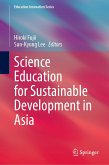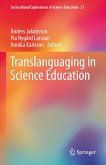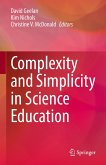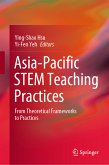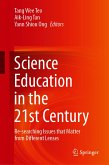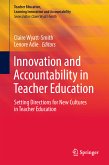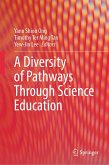Contemporary Australian Primary Science Teacher Education (eBook, PDF)
Triumphs, Tensions and Future Directions


Alle Infos zum eBook verschenken

Contemporary Australian Primary Science Teacher Education (eBook, PDF)
Triumphs, Tensions and Future Directions
- Format: PDF
- Merkliste
- Auf die Merkliste
- Bewerten Bewerten
- Teilen
- Produkt teilen
- Produkterinnerung
- Produkterinnerung

Hier können Sie sich einloggen

Bitte loggen Sie sich zunächst in Ihr Kundenkonto ein oder registrieren Sie sich bei bücher.de, um das eBook-Abo tolino select nutzen zu können.
This book provides an evidence-based response to how 'classroom-readiness' translates into the preparation of future teachers of science. It juxtaposes contemporary understanding of programming and practices in initial teacher education in an Australian context against international narratives. Through this, this book shifts the understanding of primary science education from a deficit model to one that critically examines, challenges and contest what is happening in this space, and why. It proposes problems of practice in primary science teacher education and then draws on these provocations to provide insights into possible solutions.…mehr
- Geräte: PC
- ohne Kopierschutz
- eBook Hilfe
- Größe: 3.38MB
![Science Education for Sustainable Development in Asia (eBook, PDF) Science Education for Sustainable Development in Asia (eBook, PDF)]() Science Education for Sustainable Development in Asia (eBook, PDF)113,95 €
Science Education for Sustainable Development in Asia (eBook, PDF)113,95 €![Translanguaging in Science Education (eBook, PDF) Translanguaging in Science Education (eBook, PDF)]() Translanguaging in Science Education (eBook, PDF)105,95 €
Translanguaging in Science Education (eBook, PDF)105,95 €![Complexity and Simplicity in Science Education (eBook, PDF) Complexity and Simplicity in Science Education (eBook, PDF)]() Complexity and Simplicity in Science Education (eBook, PDF)105,95 €
Complexity and Simplicity in Science Education (eBook, PDF)105,95 €![Asia-Pacific STEM Teaching Practices (eBook, PDF) Asia-Pacific STEM Teaching Practices (eBook, PDF)]() Asia-Pacific STEM Teaching Practices (eBook, PDF)73,95 €
Asia-Pacific STEM Teaching Practices (eBook, PDF)73,95 €![Science Education in the 21st Century (eBook, PDF) Science Education in the 21st Century (eBook, PDF)]() Science Education in the 21st Century (eBook, PDF)73,95 €
Science Education in the 21st Century (eBook, PDF)73,95 €![Innovation and Accountability in Teacher Education (eBook, PDF) Innovation and Accountability in Teacher Education (eBook, PDF)]() Innovation and Accountability in Teacher Education (eBook, PDF)113,95 €
Innovation and Accountability in Teacher Education (eBook, PDF)113,95 €![A Diversity of Pathways Through Science Education (eBook, PDF) A Diversity of Pathways Through Science Education (eBook, PDF)]() A Diversity of Pathways Through Science Education (eBook, PDF)105,95 €
A Diversity of Pathways Through Science Education (eBook, PDF)105,95 €-
-
-
Dieser Download kann aus rechtlichen Gründen nur mit Rechnungsadresse in A, B, BG, CY, CZ, D, DK, EW, E, FIN, F, GR, HR, H, IRL, I, LT, L, LR, M, NL, PL, P, R, S, SLO, SK ausgeliefert werden.
- Produktdetails
- Verlag: Springer Nature Singapore
- Seitenzahl: 111
- Erscheinungstermin: 6. September 2024
- Englisch
- ISBN-13: 9789819756605
- Artikelnr.: 71528676
- Verlag: Springer Nature Singapore
- Seitenzahl: 111
- Erscheinungstermin: 6. September 2024
- Englisch
- ISBN-13: 9789819756605
- Artikelnr.: 71528676
- Herstellerkennzeichnung Die Herstellerinformationen sind derzeit nicht verfügbar.
Dr. Kimberley Pressick-Kilborn has worked in primary and secondary schools in New South Wales (NSW), Australia as a teacher, school leader and education researcher for more than 25 years. She currently is Director of Research (Pre-School - Year 12) at Trinity Grammar School and an Honorary Industry Fellow at the University of Technology Sydney (UTS). Kimberley previously was a Senior Lecturer in the UTS's Teacher Education Program, with a focus on primary education. Since completing her doctorate in 2010, Kimberley's research has continued to focus on educational psychology, with consideration of students' interest and motivation development particularly in STEM learning contexts. Her research has been published in international journals and edited books, and presented at international conferences. Kimberley has contributed to the leadership of three successful funded research evaluations of key Australian science and technology programs and initiatives. She has a particular interest in practitioner research and teaching innovation informed by collaborative research.
Reece Mills is an Associate Professor of Education at Queensland University of Technology (QUT), Brisbane, Australia. He commenced his career in Education as a secondary school science teacher before being appointed at QUT. Reece has previously been a Bachelor of Education (Primary) Course Coordinator and a School Research Ethics Advisor. His research aims to create socially and ecologically sustainable futures through education. Reece's research foci centre around his values (sustainability), discipline area (science education), and practice (Initial Teacher Education). He presently holds two Australian Research Council (ARC) grants investigating teacher shortages - one about career change teachers and one about hardest-to-staff schools.
Associate Professor Linda Pfeiffer is the Deputy Dean Research for the School of Education and the Arts at CQ University, Australia. Linda has taught secondary and primary science and developed the science and STEM units in undergraduate and postgraduate courses. Linda is a research higher degree supervisor and has lead multiple research projects. Linda won the 2016 Women in STEM Research prize and designed the STEM Central industry-funded facility in Gladstone, Queensland. Linda is committed to improving the quality of science and innovation learning experiences at all levels of education from pre-Kindergarten right through to post-graduate and for all sectors of the community.
Dr. James Deehan is a Senior Lecturer in Teacher Education at Charles Sturt University (CSU), Bathurst, Australia. He has researched and taught primary science education for over 10 years. James has served as both a Higher Degree Research Coordinator and the Sub-Dean of Graduate Studies for the Faculty of Arts and Education at CSU. His early research focused on impactful primary science teacher education for both on-campus and distance learners. More recently, James' research has focused on primary science teaching in schools and STEM education in regional, rural, and remote Australia. Although James is primarily focused on primary science education, he is passionate about all forms of education that improvement societal equity and cohesion.
.- What is the purpose of primary science teacher education.
.- What models of practices characterise approaches to primary science teacher education.
.- How are science specialisations conceptualised and realised in primary teacher education.
.- What are the possibilities and challenges inherent in STEM for primary science teacher education.
.- Where is primary science teacher education headed.
.- What is the purpose of primary science teacher education.
.- What models of practices characterise approaches to primary science teacher education.
.- How are science specialisations conceptualised and realised in primary teacher education.
.- What are the possibilities and challenges inherent in STEM for primary science teacher education.
.- Where is primary science teacher education headed.

